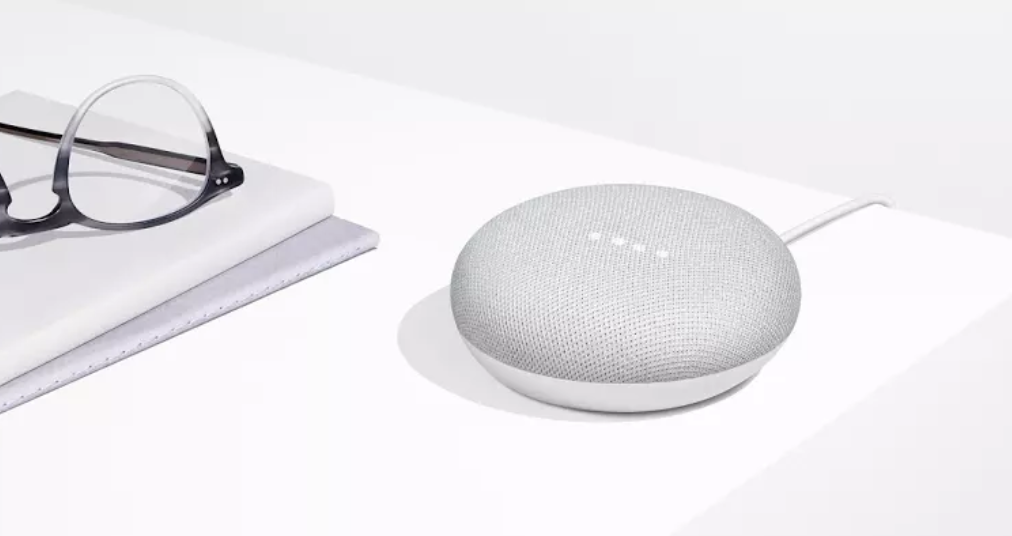At an event in San Francisco on Wednesday, Google, the second most valuable company in the world, shared all kinds of new things it wants to do in your home. Basically, Google would like to be in every room of your house. Google would like you to tell it things and wants to answer your questions. Google even wants to predict what you’re thinking—so you don’t even have to ask anymore.
At Wednesday’s event, the company shared two new home speakers, the Mini and the Box. Google now has three smart speakers, with all different sizes to match any room of the house. The company also unveiled new operability features with smart-home devices from Nest, a hardware company that Google acquired in 2014. Now if you have Google’s Chromecast, a digital media player that can curate content for your TV, your Nest smart doorbell will show a video of who is at the door. The doorbell even has facial recognition, so it can broadcast to your speakers the name of the visitor. When you’re ready to go to bed, just say: “OK, Google, good night.” Google’s speaker will hear you, and your smart lightbulbs will dim.
These new speakers run on Google’s operating system and work best with other Google products. So, you can connect your Apple Music subscription to your Google Home speakers through Bluetooth, but you can’t tell your speakers to turn the volume down or change tracks, as you can with other streaming services, like Google Play Music or Spotify. Like Amazon’s Echo, the Google smart speakers can order you an Uber or understand your command to play Netflix, but if you wanted to order a toothbrush off Amazon with your voice, you’re out of luck. In other words, Google’s Home products aren’t super compatible with its competitors. If Google had its druthers, I’d imagine the company would prefer its Google Home customers to use all Google and Google-affiliated products: Google Play Music, Google Shopping, YouTube, Nest, Google Calendar, Android, the list goes on.
That’s not unexpected. There’s a reason the EU ordered Google to pay $2.7 billion for favoring its shopping service over others—the largest fine for anti-competitive behavior from the EU ever given to a company. Soon, Google is expected to face what could become an even bigger antitrust case over its Android mobile operating system. That fine could amount to $9 billion.
As the smart-speaker wars heat up between Amazon, Google, and now Apple (which announced its Home Pod in June), expect even less interoperability between these companies. As with smartphones and laptops, your home may become trapped in the ecosystem of a single corporation.
It may be tempting to give in to the convenience offered by being able to verbally command your house to do what you please, but there are good reasons to hold out.
That’s because giving your home over to a single company means giving away your privacy. Google, unlike Apple and Amazon, is primarily an advertising company. Google raked in more than $79 billion in digital ad revue in 2016, more than any other company in the world. (For perspective, Facebook was a distant second, making about $27 billion in online ad dollars in 2016.) Google’s ads are so effective because the company leverages the vast amount of data it’s able to collect on internet users.
Google says it does not serve ads on its Home speakers, but in May, when some Google Home users said, “OK, Google, tell me about my day,” they didn’t just hear the usual information about the weather and their upcoming appointments. Google capped the message with an oh-so-chill aside: “By the way, Disney’s live action ‘Beauty and the Beast’ opens today.” Google said this wasn’t an ad—it was a mere initiative where the company invites its “partners to be our guest and share their tales.” Right.
Google says on its website that Home users can pick and choose what data is shared with the company, but in all likelihood, most people will go with the default option of sharing as much as Google wants to know. That doesn’t mean that Google’s speaker is listening to you at all times—it is supposed to start listening if a particular trigger word is said and then only for a few seconds to process the command. But even that little bit of listening lets it know when you wake up, what items you need around the house, the music you like, how many other people live at your house, your eating habits, and more. It’s a gold mine of personal information that can ostensibly be used to serve ads on other Google products, perfectly tailored to your needs at any given time.
So, Ok, Google, I understand that it’s still the early days of Home smart speakers. But considering how invested Google is in digital ads, and the slip that happened this year with Beauty and the Beast only months after Google released its first Home speaker, I’d be shocked if the company doesn’t find some way to leverage the data it collects about customers in the privacy of the home to help advertisers better target people.
If the convenience that comes with locking your private home life into Google’s product cycle and advertising machine feels worth it, then you’re in luck. Google’s Home products are only going to get smarter the more they know about you. But I’m cool just dimming the lights myself.
